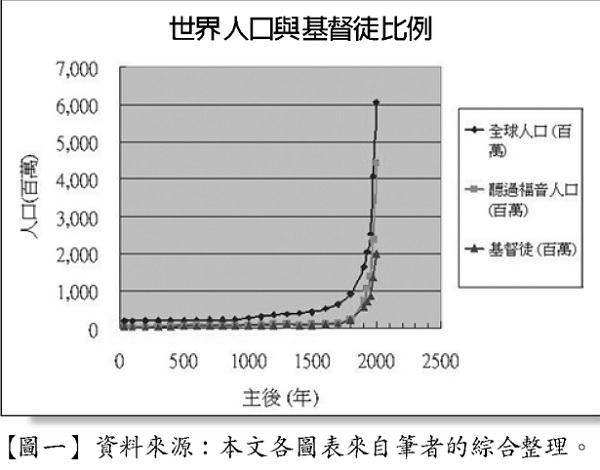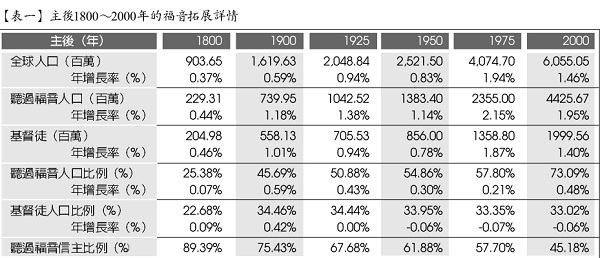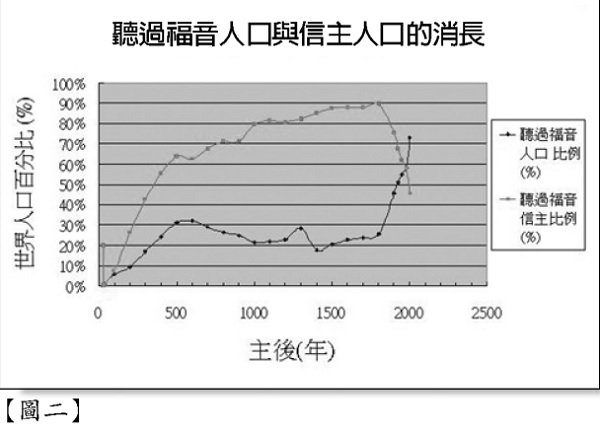Three keys to the growth of the Kingdom of God: allowing people to receive the Lord’s love, stabilizing church life, and church team shepherding
【Overview of the Kingdom of God】

God wants us to “be fruitful and multiply and fill the earth” (Genesis 1:28). God the Father also wants each of us to be saved and does not want any of us to perish (see 1 Timothy 2:4; Peter 2 Chapter 3 verse 9). The author mentioned in the last issue that due to the development of science and technology, medicine and health, the world's population has increased from 1.6 billion to 6.1 billion in the past century. It can be said that there is considerable progress in the matter of "multiple children and filling the earth". Achievement. As for everyone being saved and no one perishing, our achievements over the past 100 years have been mediocre. The proportion of Christians in the world's population has even dropped slightly from 34% to 33%.
In addition, we are growing up at a turning point in an era of rapid population growth. The population living today is almost equal to the total population of the world in the past. Therefore, today is a critical moment for the spread of the gospel. If we gain this generation, we will gain most of mankind for the Lord; if we lose this generation, we will be seriously out of touch with the Great Commission entrusted to us by the Lord (see Figure 1) .
A closer look at the gospel situation over the past century (see Table 1) shows that the decline in the proportion of the Christian population began fifty years ago. However, looking at today in the 21st century, with convenient transportation and developed information, the advantages and opportunities of the gospel environment are actually just like those in the first century. How should we seize the opportunities, live up to the great commission entrusted by the Lord, and spread the gospel widely?

The author would like to propose three "three keys to the growth of the Kingdom of God" to share with brothers and sisters:
1. The way to preach the gospel: It is important to preach the gospel, but in the future, it is even more important to let people experience the love of the Lord.
From the chart above we can see that the proportion of people who have heard the gospel has been increasing until recently, with a growth rate exceeding the birth rate. According to current trends, 100% of the people in the world will have heard the gospel in less than thirty years. Therefore, the reason for the stagnant proportion of the Christian population is not that the gospel is not preached enough, but that people have heard the gospel but have not believed in the Lord.

Let us look at the growth and decline in the proportion of people who have heard the gospel and believe in the Lord (see Figure 2). After the death and resurrection of the Lord Jesus and the descent of the Holy Spirit, the proportion of people who have heard the gospel and believe in the Lord has increased year by year from 0.5% to the early 19th century. 89% reached its highest peak (eighty-nine people believed in the Lord out of every 100 people who heard the gospel), and then gradually declined to today's 45%. Has the power of the gospel weakened? Absolutely not! For “Jesus Christ is the same yesterday, today, and forever” (Hebrews 13:8).
The gospel is the power of God (see Romans 1:16). The problem is that as technology and the environment change, the strategy of evangelism has not changed. Jesus said, "You search the Scriptures, because you think that in them you have eternal life; and they are the Scriptures that testify about me. Yet you refuse to come to me and have life." (John 5:39-40) These words today To be more real, it is important to teach people to understand the words of the Bible, but it is even more important to let people experience the love of God.
Paul also mentioned: "…We know that we all have knowledge. But knowledge makes people exalt themselves, but only love can build people up." (1 Corinthians 8:1) There is a saying:
People don't care how much you know;
Unless they know how much you care about them.
People do not care how much you know,
unless they know how much you care.
If you want to preach the gospel today with the development of information, conveying the love of the Lord is far more important than conveying the knowledge about the Lord. The Lord said, "Truly, truly, I say to you, unless a person is born again, he cannot see the kingdom of God." (John 3:3) He also said, "Truly, I say to you, unless you turn around, you will become little people." (John 3:3) "No one born like a child will enter the kingdom of heaven." (Matthew 18:3) Is this because children easily accept the love of the Lord even though they do not have advanced knowledge of the Bible?

2. The type of church: It is important to preach and teach well, but a loving and stable church life is even more important.
If bringing someone to Christ (rebirth) is like helping a child to be born, the matters discussed above are like the issue of "birth rate." However, according to the observations of the United Nations, the "birth rate" is not the most important factor in the great growth of the world's population in the past century (in fact, the world's average fertility rate has decreased by about 40% in the past 50 years), but the increase in "survival rate" is the largest elements.
It is estimated that the average life expectancy of the world's population has increased from 30 years to the current 65 years in the past century. Life expectancy in the Third World (Asia, Africa, and South America) has increased over the past fifty years from 41 to 63 years (this was the life expectancy in the United States in 1940), and infant mortality in these regions has also dropped by two-thirds. . Similarly, "survival rate" seems to be one of the most important factors in the number of believers.
A few years ago, a friend in the publishing industry told me that about two-thirds of Taiwan’s Christians have been lost (no longer participate in the church after being baptized, or no longer consider themselves Christians). Recently, a British friend told me that only about 7% Christians in the UK have church life (there are 68% people in the UK who claim to be Christians); the German pastor who chatted with us said that only about 2% Christians in Germany have church life. (Germany has a population of 70% claiming to be Christians); the United States is relatively good, with about 40% Christians living in churches (the United States has a population of 85% claiming to be Christians).
If Christians do not have a church life, their chances of leading others to believe in the Lord are slim (see John 15:4). If you do not bear fruit, you will easily lose yourself in the Lord (see John 15:6). Several of the friends mentioned above admit that this is the result of the church's inability to attract Christians. A few years ago, for several summers in a row, Pastor Xia Zhongjian of the Taiwan Evangelical Association would bring groups of pastors and elders to the United States to learn and learn. My wife and I arranged the trip to the United States. We have been to a seeker-sensitive church in Saddleback, Southern California, and a seeker-driven church in Willow Creek, Chicago. I also visited the Brooklyn Tabernacle Church in New York, which is pastored by my friend Pastor Jimmy Xin, on several occasions. It is a "praying temple" church. These churches are very prosperous and blessed by the Lord.
These so-called representative churches with different strategies all have one thing in common: these churches all have the love of the Lord and the presence of the Lord. The prosperity and attraction of these churches are the result of the Lord’s love and presence, and the selection and application of strategy and tactics are secondary. This is also the "church health" constitution emphasized by Pastor Rick Warren and many church growth experts, because a healthy church will naturally grow.
3. The focus of church growth: going beyond the growth of a single church and focusing on the operation of the church team.
In fact, healthy churches not only grow but also reproduce. We all know that God wants everyone to be saved and does not want any of us to perish. However, we rarely think about how to work with God to fulfill our Heavenly Father’s desire to love us.
We spend the most time trying to grow the single local church we participate in. We envy other people's churches for their large numbers and majestic and beautiful synagogues, and try our best to grow our own churches, hoping that one day it will be the same. However, these patterns are not found in the Bible. We have never heard of Paul writing to the church in Corinth or the church in Ephesus and asking: How many of you have gatherings now? One hundred people or two hundred people? What synagogues have you bought or built now? Have you "built a church" yet?
What Paul is concerned about is whether they love each other and are godly and loving to the Lord? Are you following the Lord’s teachings? Are you submitting to the leading of the Holy Spirit? Paul is also concerned about whether the poor brothers and sisters should be taken care of? Is there a church—the Body of Christ—everywhere that loves the Lord and loves others? Therefore, Paul pastored in Antioch for several years. He not only went to the Galatia region in what is now Turkey in Asia to establish churches, but also spread the gospel widely in Greece, Europe. In his letter to the church in Rome, Paul also mentioned that he wanted to go to Spain to establish churches and preach the gospel, and that he would also visit them.
What Paul was concerned about was not the size of a church, but whether there were churches of the Lord everywhere so that they could serve the Lord and serve people. Unlike most missionaries today, Paul did not leave a place alone. Not only did he often find ways to go back to visit them, he also never forgot to write to them. He wrote in Antioch to the churches in Galatia, Turkey (Galatians), in Corinth to the brothers and sisters in Thessalonica (1 and 2 Thessalonians), in Ephesus Letters to the Church in Corinth (1 Corinthians), etc. Paul was dedicated to pioneering churches, but he did not forget the churches he had previously pioneered and pastored. To paraphrase his own words: "We as apostles of Christ...were tender among you, as a mother nurses her own children." (1 Thessalonians 2:6-7)
This is probably one of the places where today’s church is very different from the early church recorded in the Bible. The early churches were rarely independent churches, but mostly in a church team (Fellowship of Churches). For example: the Jerusalem Church and the Samaritan Church were in a team, and were mainly cared for and shepherded by Peter and John; The church in Ephesus, the church in Thessalonica, and the church in Corinth are on the same church team, and are mainly cared for and shepherded by Paul, Timothy, Titus, and others. The early church was rarely pastored by one pastor alone, but was pastored by a team of several pastors (team pasturing); the early church rarely had full-time pastors, and full-time pastors were apostolic itinerant pastors, apostolic pastors Not all are so-called full-time pastors, there are also “apostolic bivocational pastors” like Paul and Barnabas.
Dr. C. Peter Wagner, a world-renowned church growth expert, pointed out that the "Fellowship of Churches" is the most effective church group today, which can promote many people to believe in the Lord and change their lives. This group has expanded far beyond the world's largest denomination, the Southern Baptist Convention, or the declining mainstream denominations, such as the Presbyterians or the Lutherans.
Denominations are mainly connected by organizations, while church teams are connected by relationships. If "meeting" is an inevitable operation method of the former, "fellowship" is an indispensable operation method of the latter. If the former mainly decides things by "voting", the latter decides by consensus. Dr. Wegener calls the "church team" the "New Apostolic Church" (refer to his book "The New Apostolic Church", published by Elim). He believes that the new apostolic church will soon become the largest evangelical group (refer to his book "The Church"). "The Great Earthquake", Feiying Publishing), will also become an important role in shouldering the important mission of spreading the gospel widely.
In the next issue, the author will share some experiences of participating in the church team. May we imitate Paul, as Paul encouraged us, as he imitated Christ (see 1 Corinthians 11:1).
 Author profile
Author profile
Dr. Yang Yongqing (first from right) takes a photo with his wife Li Li and son Yang Junan. Dr. Yang is the founder and senior pastor of Christian Pioneer Church, the director of Christian Pioneer Leadership Academy, and the CEO of Flying Eagle Publishing. He holds a Ph.D. in Materials Science from the University of Illinois (Champaign Campus), a Master of Chemistry and a Master of Business Administration from Cleveland State University in the United States. His theological education was obtained from Bethel Theological Seminary in the United States.
